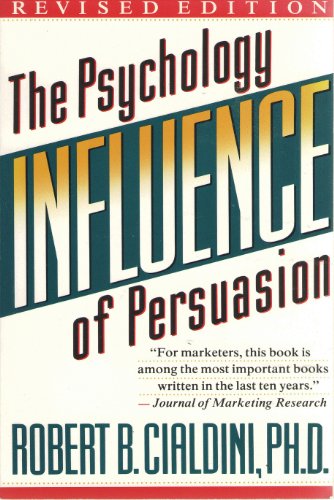Some people just won't take no for an answer. In
Influence, Dr. Robert Cialdini explains the six psychological principles that drive our powerful impulse to comply to the pressures of others and shows how we can defend ourselves against manipulation (or put the principles to work in our own interest).
Influence guarantees two things: Readers will never say yes again when they really mean no, and they'll be more persuasive than ever before.
Influence (rev)
The Psychology of PersuasionBy Robert CialdiniHarperCollins Publishers, Inc.
Copyright © 2006 Robert Cialdini
All right reserved.ISBN: 0688128165Chapter One
One of the reasons reciprocation can be used so effectively as a device for gaining another's compliance is its power. The rule possesses awesome strength, often producing a "yes" response to a request that, except for an existing feeling of indebtedness, would have surely been refused. Some evidence of how the rule's force can overpower the influence of other factors that normally determine whether a request will be complied with can be seen in a second result of the Regan study, Besides his interest in the impact of the reciprocate rule on compliance Regan was also interested in how liking for person affects the tendency to comply with that person's request. To measure how liking toward how affected the subjects' decisions to buy his raffle tickets, Regan had them fill out several rating scales indicating how much they liked Joe. He then compared their liking responses with the number of tickets they had purchased from Joe. There was significant tendency for subjects to by more raffle tickets from Hoe the more they liked him. But this alone is hardly a startling finding. Most of us would have guessed that people are more willing to do a favor for someone they like.
The interesting thing about the Regan experiment, however, is that the relationship between liking and compliance was completely wiped out in the condition under which subjects had been given a Coke by Joe. For those who owed him a favor, it made no difference whether they liked him or not; they felt a sense of obligation to repay him, and they did. The subjects in that condition who indicated that they disliked Joe bought just as many of his tickets as did those who indicated that they liked him. The rule for reciprocity was so strong that it simply overwhelmed the influence of a factor—liking for the requester—that normally affects the decision to comply.
Continues...Excerpted from Influence (rev)by Robert Cialdini Copyright © 2006 by Robert Cialdini. Excerpted by permission.
All rights reserved. No part of this excerpt may be reproduced or reprinted without permission in writing from the publisher.
Excerpts are provided by Dial-A-Book Inc. solely for the personal use of visitors to this web site.
![]()
